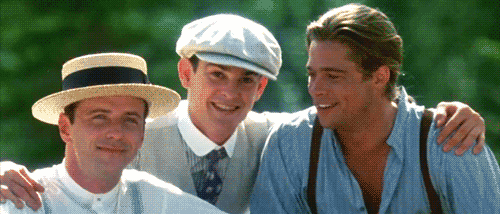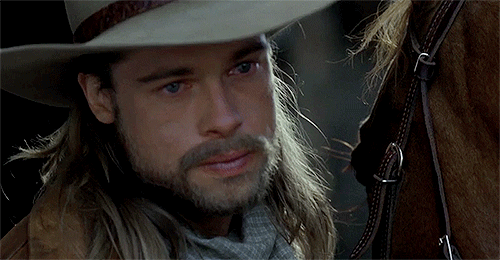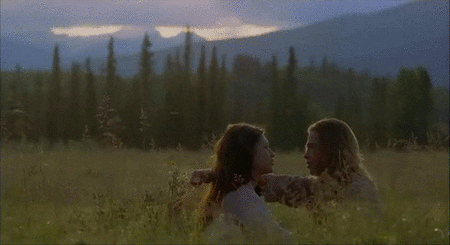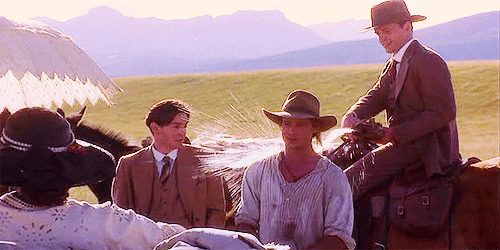Legends of the Fall was a film before its time. Released 25 years ago, but set in the early 1900s, the classic drama depicts the tumultuous lives of the Ludlow family. Colonel William Ludlow (Anthony Hopkins) is the patriarch; his sons are uptight Alfred (Aidan Quinn), untamed Tristan (Brad Pitt), and naïve Samuel (Henry Thomas), all of whom at one point or another fall for Samuel’s passionate fiancée Susannah (Julia Ormond). One of the film’s central themes is masculinity (though when it was made, that term wasn’t part of the zeitgeist like it is now). Each of the Ludlows struggles to define what makes a good man, and for the most part, they all get it right, albeit in distinct ways. On the film’s quarter-century anniversary, we’re unpacking why Legends of the Fall is still one of the best movies about masculinity. (Warning: minor spoilers ahead!)
Cover Photo: TriStar Pictures
Mandatory Movies: What To Watch When You Need To Man Up
Making a real man: 17 Chivalrous Acts We Want to Bring Back
Follow Mandatory on Facebook, Twitter, and Instagram.
Legends of the Fall 25 Years
-
They put family first.

Men are not islands, and the Ludlows are no exception. In a time when rugged individualism is prized, everything this family does is family-centric. When Samuel signs up for World War I, Alfred enlists, too. Tristan enlists as well, not because he believes in the war but because he wants to protect Samuel. When his effort to save Samuel during a reconnaissance fails, he cuts out his brother’s heart and sends it home. Upon returning from war, Alfred offers to marry Susannah. While not entirely selfless (he is in love with her, after all), marrying the widow of one’s brother is a practice dating back to biblical times. Alfred believes that by marrying her (and providing for her), he’ll honor his brother’s legacy. Talk about keeping it in the family!
-
They feel all the feels.

Contrary to the stoic stereotype of a “manly man,” the Ludlows express a wide range of emotions – anger, jealousy, joy, sadness, grief, regret – and they don’t apologize for it. Tristan cries multiple times throughout the film, even in front of his love interest, Susannah.
-
They're chivalrous.

For having been raised primarily by their father, these guys know how to behave around a lady, whether it's tipping their hat or pulling a chair out for her at dinner. They save their naughty conversations for bro time, and even then, Samuel can't bring himself to say the "F" word in reference to deflowering his fiancée when speaking to Tristan.
-
They respect the independence of women.

Isabel (Christina Pickles), the matriarch of the family, can’t put up with the rural Montana winters, so she leaves the family ranch, but she and Colonel Ludlow stay married and correspond regularly. (Quite the modern arrangement if we do say so ourselves.) When Susannah first comes to visit the ranch, the Ludlow brothers teach her to lasso a horse and shoot a gun. Colonel Ludlow and Susannah also volunteer to teach young Isabel Two (Sekwan Auger), the biracial child of the housekeepers, because Colonel Ludlow believes it will enrich her life. For the era in which they lived, these men truly treated women right, with reverence and awe and adoration. They empowered women before "empowerment" was even in the modern man's vocabulary.
-
They honor cultural differences.

Colonel Ludlow has a history of fighting for the rights of Native Americans in the past. Now, his right-hand man, One Stab (Gordon Tootoosis), lives with and works for the family. While Stab knows English, he won’t “lower himself” to speak it – and the family accepts this. He speaks to them only in his native language yet everyone still manages to communicate. When Stab is denied a beer at a watering hole, Tristan schools the racist bartender: "You see this man? His name is One Stab. He's a venerated elder of the Cree nation. He's counted coup on hundreds of his enemies. He is our friend, and he is thirsty."
There are also two interracial marriages and several bicultural children that are celebrated by the Ludlow family in the film. Finally, Colonel Ludlow will not allow anyone to refer to Isabel Two as a “half-breed.” At every turn, the Ludlows defend their Native American friends and family. And while the family does incorporate some Native traditions into their lives, they don’t appropriate them.
Photo: TriStar Pictures
-
They fight for social justice.

As a veteran, Colonel Ludlow has strong opinions on what he refuses to call “civilization.” He's even written a book to persuade the government to change its policies toward Native Americans. As a pacifist, he opposes his sons going to World War I and curses Alfred for running for Congress. Colonel Ludlow also offers refuge to a white fugitive, Decker (Paul Desmond), who is married to the family’s Native housekeeper, Pet (Tantoo Cardinal) and evades the authorities’ questions about Decker’s whereabouts. Colonel Ludlow speaks brutal truth to power whenever corrupt bureaucrats appear on the ranch.
-
They don’t use violence unless necessary.

Violence is present throughout this film, but it isn’t used to gratuitously take lives; it’s to defend them. The Ludlows only use violence when absolutely necessary – to save their own lives or to avenge a murder. OK, so Tristan goes off the rails a couple of times after returning from war, but he isn't indiscriminately angry. He always has a reason for the use of force.
-
But they're still playful.

Boys will be boys, and the Ludlows are still rough-and-tumble dudes through and though. But their roughhousing is a loving form of affection, and never intended to harm.
-
They revere nature.

Unlike the boneheaded idea that man must dominate nature, the Ludlows coexist with it. Their ranch appears to be a sustainable operation, in which they care for the land and the land takes care of them. The Ludlows are knowledgeable about the natural world around them (Samuel can identity each individual flower in a bouquet given to Susannah), and animals are treated ethically. Granted, Tristan has a beef with that one grizzly bear, but even then, he’s looking less to kill it than be killed by it.




